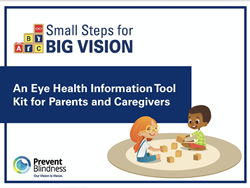
“Small Steps for Big Vision” program launched from the National Center for Children’s Vision and Eye Health at Prevent Blindness and the National Head Start Association,
“NHSA is proud to partner with Prevent Blindness on Small Steps for Big Vision. With Head Start being a comprehensive early childhood program, vision screenings are a critical piece of its work to support the overall wellbeing of young children,” said Yasmina Vinci, executive director at NHSA.
CHICAGO (PRWEB)
October 20, 2020
The National Center for Children’s Vision and Eye Health at Prevent Blindness (NCCVEH) and the National Head Start Association (NHSA) joined together to launch the new “Small Steps for Big Vision: An Eye Health Information Tool Kit for Parents and Caregivers.” The purpose of the new free resource is to provide parents and caregivers with the necessary information and assistance to care for their children’s vision and eye health, as well as their own.
According to the recent report, “Children’s Vision and Eye Health: A Snapshot of Current National Issues 2nd Edition,” vision plays an important role in children’s physical, cognitive, and social development. At least one in five children enrolled in Head Start has an uncorrected vision disorder. Uncorrected refractive errors (including significant near-sightedness, far-sightedness, and astigmatism) in preschool-aged children can negatively impact early literacy skills and school readiness. Early visual functioning is a strong predictor of academic performance in school-aged children.
The “Small Steps for Big Vision: An Eye Health Information Tool Kit for Parents and Caregivers” includes materials to provide for a Parent/Caregiver Vision Social or Meeting (PowerPoint presentation, script, training manual, activities, and handouts); Parent and Caregiver fact sheets; and multimedia links on a wide range of eye health and safety topics. Materials are available in English and Spanish.
The Small Steps for Big Vision tool kit is designed especially for Early Head Start, Head Start, child care, early care and education programs, and parent education and advocacy organizations to significantly impact the vision of children and their families across the United States for years to come. The Small Steps for Big Vision resource was approved by a select group of volunteers from the ophthalmology, optometry, non-profit and public health fields. Head Start programs that conducted pilot testing of the Small Steps for Big Vision resource include:
1. Monongalia County Head Start (WV)
2. Guilford Child Development (NC)
3. Catholic Charities, Diocese of Joliet (IL)
4. ISWA Head Start (SC)
5. East Coast Migrant Head Start: La Familia Center (FL) and Colleton Center (SC)
“Receiving a referral because a child did not pass a vision screening can be met with confusion and misunderstanding,” said Jeff Todd, president and CEO of Prevent Blindness. “The ultimate goal of the Small Steps for Big Vision program is to help provide needed information in order to significantly increase the number of children completing follow-up care with an eye doctor after children do not pass vision screening.”
“NHSA is proud to partner with Prevent Blindness on Small Steps for Big Vision. With Head Start being a comprehensive early childhood program, vision screenings are a critical piece of its work to support the overall wellbeing of young children,” said Yasmina Vinci, executive director at NHSA. “We know that during a pandemic, there are added challenges to connecting with families and executing those crucial vision screenings. That is why we are proud to share this new resource that provides the Head Start community with guidance on the most effective way to continue screenings amidst COVID-19.”
Small Steps for Big Vision was supported by the Health Resources and Services Administration (HRSA) of the U.S. Department of Health and Human Services (HHS) as part of an award totaling $300,000 with 3 percent financed with nongovernmental sources. The contents are those of the author(s) and do not necessarily represent the official views of, nor an endorsement, by HRSA, HHS or the U.S. Government.
For more information about the Small Steps program, please contact the NCCVEH, at http://nationalcenter.preventblindness.org, or Donna Fishman at (800) 331-2020 or dfishman@preventblindness.org.
About the National Center for Children’s Vision and Eye Health at Prevent Blindness
Founded in 1908, Prevent Blindness is the nation’s leading volunteer eye health and safety organization dedicated to fighting blindness and saving sight. Focused on promoting a continuum of vision care, Prevent Blindness touches the lives of millions of people each year through public and professional education, advocacy, certified vision screening and training, community and patient service programs, and research. In 2009, Prevent Blindness established the National Center for Children’s Vision and Eye Health, with funding and leadership support from the HRSA Maternal and Child Health Bureau. Serving as a major resource for the establishment of a public health infrastructure, the National Center advances and promotes children’s vision and eye care, and provides leadership and training to public entities throughout the United States. The National Center is advised by a committee of national experts and leaders from the fields of ophthalmology, optometry, pediatrics, nursing, family advocates and public health to guide the work and recommendations of the Center. For more information, or to make a contribution to the sight-saving fund, call 1-800-331-2020. Or, visit us on the Web at http://nationalcenter.preventblindness.org or http://www.facebook.com/preventblindness.
###
Share article on social media or email:

